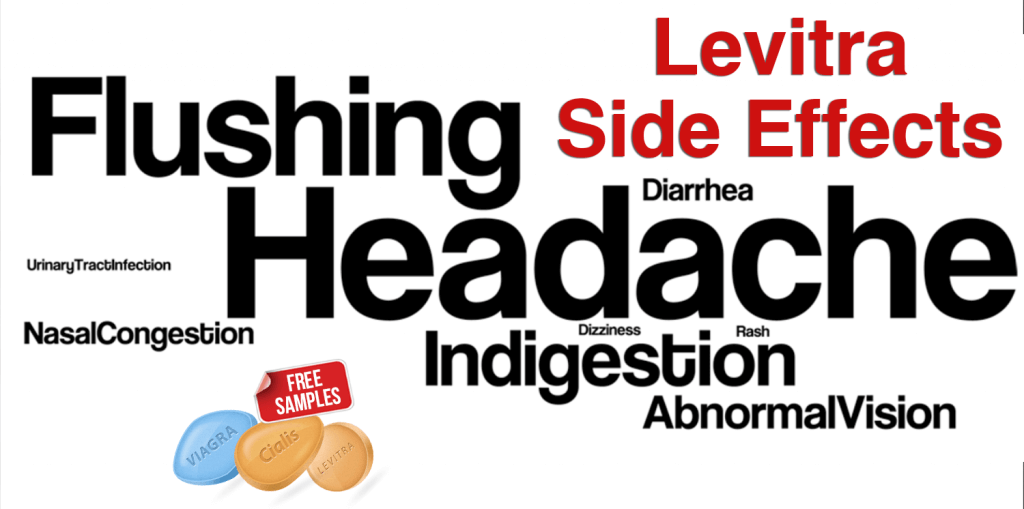Levitra Side Effects
This page contains important information about Levitra side effects – both common and less common.

At viabestbuy.com, we offer only high-quality Viagra 100, Cialis and generic Levitra. For those who are not sure they want to buy Levitra online, we invite you to try 10 tablets of free Levitra samples. All you have to pay is shipping costs, and you will receive a free ED trial pack including Levitra.
Levitra (also known as Vardenafil) is one of a group of medications known as PDE5 inhibitors. Levitra is used in order to treat impotence (erectile dysfunction) and generic Levitra pills can be bought from an online pharmacy for less than one dollar each. The drug can be used to treat other conditions and is particularly useful in the treatment of premature ejaculation. Research estimates that approximately 40% of men could benefit from using PDE5 inhibitors such as Levitra.
All PDE5 inhibitors can cause unwanted side effects, although such occurrences are generally rare – it is possible to receive erectile dysfunction trial packs from reputable online pharmacies in order to ascertain whether Levitra side effects are negligible, or whether another PDE5 inhibitor may be right for you.
Before Taking Levitra – What You Should Know
Before taking Levitra, you should be prepared to do some research in order to understand the most common Levitra side effects, how to take Levitra and what to avoid when taking Levitra or other PDE5 inhibitors. For example, you should be aware that Levitra is most effective when taken on an empty stomach. It can be administered with food, although it will almost certainly take longer for the effects to take hold, and foods with a high-fat content can reduce the efficacy of Levitra. Grapefruit juice and grapefruit should be avoided at all costs – one of the Levitra side effects is that it simply does not work when combined with grapefruit – certain enzymes in the fruit break down the active ingredient (vardenafil), negating the use of the drug.
The effects of Levitra take hold between 15 and 120 minutes and can last for anything up to six hours. It should not be taken unless you intend to have sex, as this will increase the possibility of unwanted Levitra side effects. It is not advisable to take more than the recommended daily dose during a 24 hour period, and before doing so you should consult a certified medical professional. You should also avoid combining Levitra with other PDE5 inhibitors (such as Viagra) as this can lead to overdose.
Common Levitra Side Effects
When taking Levitra, it is possible that you may experience one or more side effects. The vast majority of Levitra side effects are not serious, and the drug generally has no effect or otherwise negative impact on your Levitra experience. Some of the more common side effects associated with Levitra include (but are not limited to) the following:
- dizziness
- nausea
- indigestion
- increased need to urinate
- a ‘pins and needles’ sensation (tingling of the skin)
- a runny or blocked nose
- facial edema
- tenderness (particularly around, the eyes, cheekbones, and chin)
- sneezing
- joint pain
- muscular pain
- diarrhea
The majority of users who experience these Levitra side effects report that the incidences are incredibly mild, and many users do not report any unwanted Levitra side effects at all, even when taking the medication on a regular basis. If you are concerned about any side effects, from any medication, you should consult a certified medical professional before continuing use.
Adverse Reactions Reported by Patients Treated with Vardenafil
| REACTION | PERCENTAGE OF PATIENTS REPORTING | |
| PLACEBO | LEVITRA 20 MG | |
| Headaches | 4% | 15% |
| Flushing | 1% | 11% |
| Rhinitis | 3% | 9% |
| Dyspepsia | 1% | 4% |
| Accidental Injury | 2% | 3% |
| Sinusitis | 1% | 3% |
| Flu Syndrome | 2% | 3% |
| Dizziness | 1% | 2% |
| Increased Creatine Kinase | 1% | 2% |
| Nausea | 1% | 2% |
Less Common Levitra Side Effects
Some Levitra side effects are slightly more serious, although these are generally only reported in very rare occurrences (less than one in 1,000 users). Some of the rarer Levitra side effects include the following:
- persistent painful erections (priapism) which if left untreated can lead to severe impotence
- seizures
- hearing problems or hearing loss
- heart palpitations
- hypersensitivity
- photosensitivity (increased sensitivity of light)
- rashes on the skin
- cold sweats
- confusion and lightheadedness
- watery eyes
- hives
- itching
- nervousness
- pain and discomfort in the jaw, back, beck or arms
- swelling of the eyelids
- wheezing
- vomiting
- unusual weakness or lethargy
- unusual sweating
- hypertension (high blood pressure)
- hypotension (low blood pressure)
In the event that you experience one or more of the most serious side effects, you should consult a doctor or certified medical professional. If you faint or experience seizures, you should attend an emergency room immediately.
Less common but non-threatening Levitra side effects can also include the following:
- loss of appetite
- shivering
- drowsiness
- white spots on the inside of the mouth
- heartburn
- abnormal ejaculation
Thankfully, these Levitra side effects are extremely rare and should not put you off enjoying a healthy sex life with the medicine. In fact, some of these side effects – such as an increase in blood pressure – can actually be attributed to a more regular sex life as a result of taking PDE5 inhibitors.
Levitra and Alcohol
Many people like to combine sex with alcohol, so it’s only natural that you may also wish to have a drink or two when taking Levitra. This is generally acceptable to do, and many people administer Levitra while drinking with no problems at all. However, it is important that you are aware that combining alcohol and Levitra could potentially impair your ability to perform in the bedroom.
It’s true that alcohol can help you to overcome performance anxiety, however, an excess of alcohol is also known to affect sexual ability. It is therefore recommended that alcohol consumption is kept to moderate, stable levels when using Levitra or any other PDE5 inhibitors.
Another thing to note is that Levitra can lower blood pressure. Alcohol is a depressant which also lowers blood pressure, and combining it with Levitra can result in dizziness, lightheadedness, irregular heartbeat and even fainting. That’s not to say it’s impossible to enjoy a glass of wine or two with Levitra – just be aware that you should stick to low amounts of alcohol in order to avoid any detrimental effects. Results will vary from person to person based on tolerance levels, height, weight, age and a number of other external factors.
Interaction With Other Drugs
Certain blood pressure medications can cause unwanted Levitra side effects when the two are combined. This is because Levitra also works to alleviate high blood pressure. Patients who take blood pressure medication should avoid driving or operating hazardous machinery when concurrently taking Levitra. It is important not to stop taking any prescribed medication without first talking to a doctor.
Levitra use is not recommended for those on medications used to treat chest pain such as angina. Such medicines (nitrites) can cause the user to faint.
Patients with hepatic problems, such as kidney failure or liver disease, or those who regularly undergo dialysis, should avoid Levitra and all other PDE5 inhibitors, as the medication can cause potentially serious problems if the hepatic system is already compromised in any way.
The following common medications and supplements may cause side effects when combined with Levitra: Amlopidine, Atorvastatin, Celebrex, Lipitor, Aspirin, Crestor, Fish Oils (fatty acids), Gabapentin, Lisinopril, Metoprolol, Omeprazole, Tramadol, Vitamin D3, Metformin, Simvastatin.
The following less common medications and supplements may also cause Levitra side effects: Antabuse, Apomorphine, Bisoprolol, Chronulac, Calcium Carbonate, Fluoxetine (Prozac), Gen Lax, Jumex and Lithium Carbonate.
If you are currently taking one or more of the above-listed medications, you should consult your doctor to find out what reactions (if any) they may have when combined with Levitra. The majority of medications only interact mildly with Levitra – in many cases, a lower dose of Levitra is recommended, particularly for those currently taking medication for high or low blood pressure.

 Free Viagra Samples 10 x 100mg
Free Viagra Samples 10 x 100mg Free Levitra Samples 10 x 20mg
Free Levitra Samples 10 x 20mg Free Cialis Samples 10 x 20mg Online
Free Cialis Samples 10 x 20mg Online